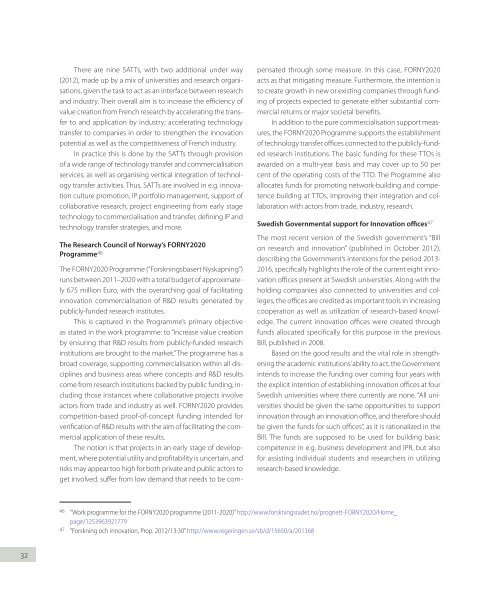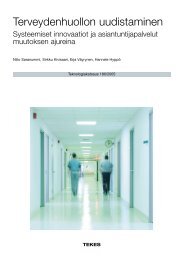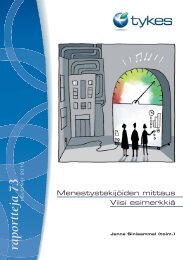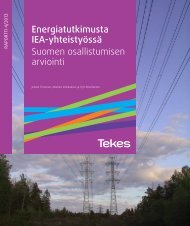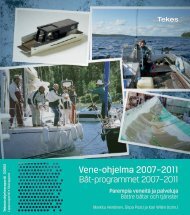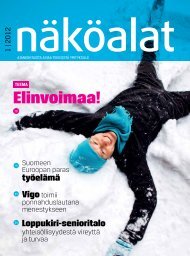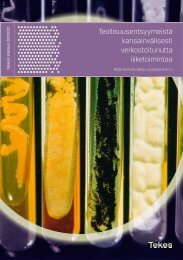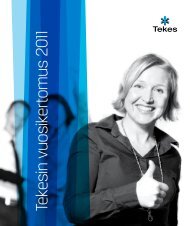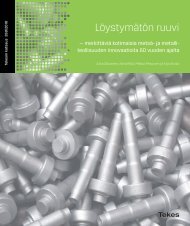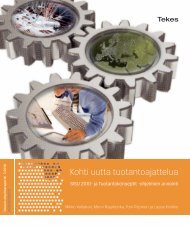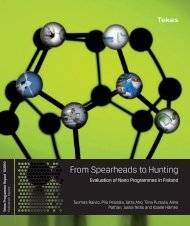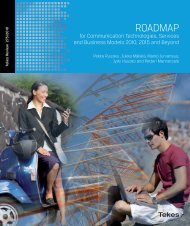Evaluation of TULI Programmes - Tekes
Evaluation of TULI Programmes - Tekes
Evaluation of TULI Programmes - Tekes
You also want an ePaper? Increase the reach of your titles
YUMPU automatically turns print PDFs into web optimized ePapers that Google loves.
There are nine SATTs, with two additional under way<br />
(2012), made up by a mix <strong>of</strong> universities and research organisations,<br />
given the task to act as an interface between research<br />
and industry. Their overall aim is to increase the efficiency <strong>of</strong><br />
value creation from French research by accelerating the transfer<br />
to and application by industry; accelerating technology<br />
transfer to companies in order to strengthen the innovation<br />
potential as well as the competitiveness <strong>of</strong> French industry.<br />
In practice this is done by the SATTs through provision<br />
<strong>of</strong> a wide range <strong>of</strong> technology transfer and commercialisation<br />
services, as well as organising vertical integration <strong>of</strong> technology<br />
transfer activities. Thus, SATTs are involved in e.g. innovation<br />
culture promotion, IP portfolio management, support <strong>of</strong><br />
collaborative research, project engineering from early stage<br />
technology to commercialisation and transfer, defining IP and<br />
technology transfer strategies, and more.<br />
The Research Council <strong>of</strong> Norway’s FORNY2020<br />
Programme 46<br />
The FORNY2020 Programme (“Forskningsbasert Nyskapning”)<br />
runs between 2011–2020 with a total budget <strong>of</strong> approximately<br />
675 million Euro, with the overarching goal <strong>of</strong> facilitating<br />
innovation commercialisation <strong>of</strong> R&D results generated by<br />
publicly-funded research institutes.<br />
This is captured in the Programme’s primary objective<br />
as stated in the work programme: to “increase value creation<br />
by ensuring that R&D results from publicly-funded research<br />
institutions are brought to the market.” The programme has a<br />
broad coverage, supporting commercialisation within all disciplines<br />
and business areas where concepts and R&D results<br />
come from research institutions backed by public funding; including<br />
those instances where collaborative projects involve<br />
actors from trade and industry as well. FORNY2020 provides<br />
competition-based pro<strong>of</strong>-<strong>of</strong>-concept funding intended for<br />
verification <strong>of</strong> R&D results with the aim <strong>of</strong> facilitating the commercial<br />
application <strong>of</strong> these results.<br />
The notion is that projects in an early stage <strong>of</strong> development,<br />
where potential utility and pr<strong>of</strong>itability is uncertain, and<br />
risks may appear too high for both private and public actors to<br />
get involved, suffer from low demand that needs to be compensated<br />
through some measure. In this case, FORNY2020<br />
acts as that mitigating measure. Furthermore, the intention is<br />
to create growth in new or existing companies through funding<br />
<strong>of</strong> projects expected to generate either substantial commercial<br />
returns or major societal benefits.<br />
In addition to the pure commercialisation support measures,<br />
the FORNY2020 Programme supports the establishment<br />
<strong>of</strong> technology transfer <strong>of</strong>fices connected to the publicly-funded<br />
research institutions. The basic funding for these TTOs is<br />
awarded on a multi-year basis and may cover up to 50 per<br />
cent <strong>of</strong> the operating costs <strong>of</strong> the TTO. The Programme also<br />
allocates funds for promoting network-building and competence<br />
building at TTOs, improving their integration and collaboration<br />
with actors from trade, industry, research.<br />
Swedish Governmental support for Innovation <strong>of</strong>fices 47<br />
The most recent version <strong>of</strong> the Swedish government’s “Bill<br />
on research and innovation” (published in October 2012),<br />
describing the Government’s intentions for the period 2013-<br />
2016, specifically highlights the role <strong>of</strong> the current eight innovation<br />
<strong>of</strong>fices present at Swedish universities. Along with the<br />
holding companies also connected to universities and colleges,<br />
the <strong>of</strong>fices are credited as important tools in increasing<br />
cooperation as well as utilization <strong>of</strong> research-based knowledge.<br />
The current innovation <strong>of</strong>fices were created through<br />
funds allocated specifically for this purpose in the previous<br />
Bill, published in 2008.<br />
Based on the good results and the vital role in strengthening<br />
the academic institutions’ ability to act, the Government<br />
intends to increase the funding over coming four years with<br />
the explicit intention <strong>of</strong> establishing innovation <strong>of</strong>fices at four<br />
Swedish universities where there currently are none. “All universities<br />
should be given the same opportunities to support<br />
innovation through an innovation <strong>of</strong>fice, and therefore should<br />
be given the funds for such <strong>of</strong>fices”, as it is rationalized in the<br />
Bill. The funds are supposed to be used for building basic<br />
competence in e.g. business development and IPR, but also<br />
for assisting individual students and researchers in utilizing<br />
research-based knowledge.<br />
46 “Work programme for the FORNY2020 programme (2011-2020)” http://www.forskningsradet.no/prognett-FORNY2020/Home_<br />
page/1253963921779<br />
47 “Forskning och innovation, Prop. 2012/13:30” http://www.regeringen.se/sb/d/15650/a/201368<br />
32


